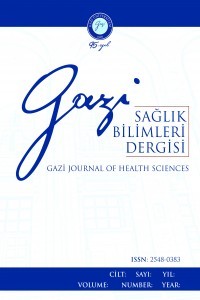Persistent Postural Perceptual Dizziness Tedavisinde Vestibüler Rehabilitasyonun Etkisi
PPPD, rehabilitasyon, vertigo, vestibüler, rehabilitation, vestibular
The Effect of Vestibular Rehabılıtatıon in the Treatment of Persistent Postural Perceptual Dizziness
PPPD, rehabilitation, vertigo, vestibular,
___
- 1. Staab JP, Eckhardt-Henn A, Horii A, et al. Diagnostic criteria for persistent postural-perceptual dizziness (PPPD): Consensus document of the committee for the Classification of Vestibular Disorders of the Bárány Society. Journal of Vestibular Research. 2017; 27(4):191-208.
- 2. Dieterich M, Staab JP. Functional dizziness: from phobic postural vertigo and chronic subjective dizziness to persistent postural-perceptual dizziness. Current opinion in neurology. 2017; 30(1):107-13.
- 3. Black FO. Clinical status of computerized dynamic posturography in neurotology. Current Opinion in Otolaryngology & Head and Neck Surgery. 2001; 9(5):314-8.
- 4. Nashner LM. Computerized dynamic posturography. In: Jacobson G, Newman, CW., Kartush, JM ed. Handbook of balance function testing: Singular Thomson Learning; 1997; 280-305.
- 5. Kim H, Lee J, Choi J, Kim J. Etiologic distribution of dizziness and vertigo in a referral-based dizziness clinic in South Korea. Journal of Neurology. 2020.
- 6. Thompson KJ, Goetting JC, Staab JP, Shepard NT. Retrospective review and telephone follow-up to evaluate a physical therapy protocol for treating persistent postural-perceptual dizziness: a pilot study. Journal of Vestibular Research. 2015; 25(2):97-104.
- 7. Norré ME, Beckers AM. Vestibular habituation training: specificity of adequate exercise. Archives of Otolaryngology–Head & Neck Surgery. 1988; 114(8):883-6.
- 8. Yan Z, Cui L, Yu T, Liang H, Wang Y, Chen C. Analysis of the characteristics of persistent postural-perceptual dizziness: A clinical-based study in China. International Journal of Audiology. 2017; 56(1):33-7.
- 9. Holmberg J, Karlberg M, Harlacher U, Magnusson M. One-year follow-up of cognitive behavioral therapy for phobic postural vertigo. Journal of neurology. 2007; 254(9):1189-92.
- 10. Tschan R, Eckhardt-Henn A, Scheurich V, Best C, Dieterich M, Beutel M. Steadfast--effectiveness of a cognitive-behavioral self-management program for patients with somatoform vertigo and dizziness. Psychotherapie, Psychosomatik, Medizinische Psychologie. 2012; 62(3-4):111-9.
- ISSN: 2548-0383
- Yayın Aralığı: Yılda 3 Sayı
- Başlangıç: 2015
- Yayıncı: Gazi Üniversitesi
ADÖLESANLARDA KRONOTİPE GÖRE ÖĞÜN ZAMANI VE BESİN TERCİHLERİNİN İNCELENMESİ
Besin Ambalajlarında Sürdürülebilirliğe İlişkin Logo Varlığının İncelenmesi: İtalya Örneği
HEMŞİRELERİN İŞYERİ ŞİDDETİNE MARUZ KALMA DURUMLARI İLE İŞ DOYUMLARI VE İŞTEN AYRILMA EĞİLİMLERİ
Nigar ÜNLÜSOY DİNÇER, Refia Selma GÖRGÜLÜ, Aslıhan BOYACIOĞLU
Multiple Sklerozlu Hastalarda El Mental Rotasyon Görevi
Büsra CANDİRİ, Engin RAMAZANOĞLU, Burcu TALU, Mehmet TECELLİOĞLU
Seval AĞAÇDİKEN ALKAN, Özge İŞERİ, Meryem KIRMIZI
Persistent Postural Perceptual Dizziness Tedavisinde Vestibüler Rehabilitasyonun Etkisi
Sağlıklı Genç Yetişkinlerde Akıllı Telefon Bağımlılığının Parmak Duyusu Hassasiyetine Etkisi
Doğaç KARAGÜVEN, İlker ÇETİN, Alper KAYA, Berk GÜÇLÜ, Burak AKAN
Gebe Kadınların Sağlık Uygulamaları Ve Etkileyen Faktörlerin İncelenmesi
